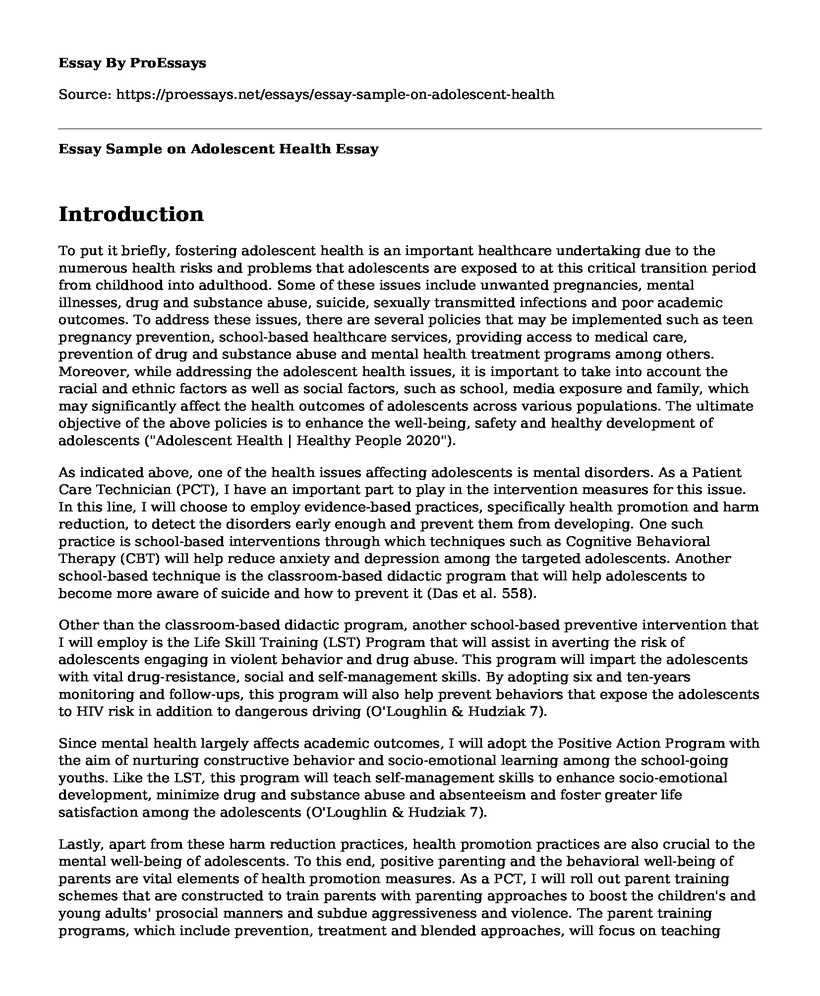Introduction
To put it briefly, fostering adolescent health is an important healthcare undertaking due to the numerous health risks and problems that adolescents are exposed to at this critical transition period from childhood into adulthood. Some of these issues include unwanted pregnancies, mental illnesses, drug and substance abuse, suicide, sexually transmitted infections and poor academic outcomes. To address these issues, there are several policies that may be implemented such as teen pregnancy prevention, school-based healthcare services, providing access to medical care, prevention of drug and substance abuse and mental health treatment programs among others. Moreover, while addressing the adolescent health issues, it is important to take into account the racial and ethnic factors as well as social factors, such as school, media exposure and family, which may significantly affect the health outcomes of adolescents across various populations. The ultimate objective of the above policies is to enhance the well-being, safety and healthy development of adolescents ("Adolescent Health | Healthy People 2020").
As indicated above, one of the health issues affecting adolescents is mental disorders. As a Patient Care Technician (PCT), I have an important part to play in the intervention measures for this issue. In this line, I will choose to employ evidence-based practices, specifically health promotion and harm reduction, to detect the disorders early enough and prevent them from developing. One such practice is school-based interventions through which techniques such as Cognitive Behavioral Therapy (CBT) will help reduce anxiety and depression among the targeted adolescents. Another school-based technique is the classroom-based didactic program that will help adolescents to become more aware of suicide and how to prevent it (Das et al. 558).
Other than the classroom-based didactic program, another school-based preventive intervention that I will employ is the Life Skill Training (LST) Program that will assist in averting the risk of adolescents engaging in violent behavior and drug abuse. This program will impart the adolescents with vital drug-resistance, social and self-management skills. By adopting six and ten-years monitoring and follow-ups, this program will also help prevent behaviors that expose the adolescents to HIV risk in addition to dangerous driving (O'Loughlin & Hudziak 7).
Since mental health largely affects academic outcomes, I will adopt the Positive Action Program with the aim of nurturing constructive behavior and socio-emotional learning among the school-going youths. Like the LST, this program will teach self-management skills to enhance socio-emotional development, minimize drug and substance abuse and absenteeism and foster greater life satisfaction among the adolescents (O'Loughlin & Hudziak 7).
Lastly, apart from these harm reduction practices, health promotion practices are also crucial to the mental well-being of adolescents. To this end, positive parenting and the behavioral well-being of parents are vital elements of health promotion measures. As a PCT, I will roll out parent training schemes that are constructed to train parents with parenting approaches to boost the children's and young adults' prosocial manners and subdue aggressiveness and violence. The parent training programs, which include prevention, treatment and blended approaches, will focus on teaching parents to respond well to their adolescents' behaviors, handle problematic mannerisms and employ active engagement in the training sessions (Haslam et al. 5). Moreover, these programs will also help in improving the relationships between young people and their parents in addition to parental competence and confidence when handling the adolescents' behaviors.
Works Cited
"Adolescent Health | Healthy People 2020". Healthypeople.Gov, 2019, https://www.healthypeople.gov/2020/topics-objectives/topic/Adolescent-Health. Accessed 8 Feb 2019.
Das, Jai K., et al. "Interventions for adolescent mental health: an overview of systematic reviews." Journal of Adolescent Health 59.4 (2016): S49-S60.
Haslam, Divna, et al. "Parenting programs." IACAPAP e-textbook of child and adolescent mental health. Geneva: International Association for Child and Adolescent Psychiatry and Allied Professions (2016).
O'Loughlin, Kerry, and J. J. Hudziak. "Health promotion and prevention in child and adolescent mental health." IACAPAP e-Textbook of Child and Adolescent Mental Health, Geneva: International Association for Child and Adolescent Psychiatry and Allied Professions (2017): 1-25.
Cite this page
Essay Sample on Adolescent Health. (2022, Nov 08). Retrieved from https://proessays.net/essays/essay-sample-on-adolescent-health
If you are the original author of this essay and no longer wish to have it published on the ProEssays website, please click below to request its removal:
- Thomson Article: A Defense of Abortion Essay
- What is Anxiety? - Paper Example
- Research Paper on Psychological Comorbidity: Mixed Anxiety and Depression
- Impact of Sids Public Health Campaign on Infant Mortality Rate in the US - Essay Sample
- Psychological and Social Aspects of Health Education Essay Example
- Essay Example on Seniors' Dual-Tasking: Cognitive Involvement & Performance Impact
- Report Example on Understanding Social Behavior: Factors that Influence Human Interaction







